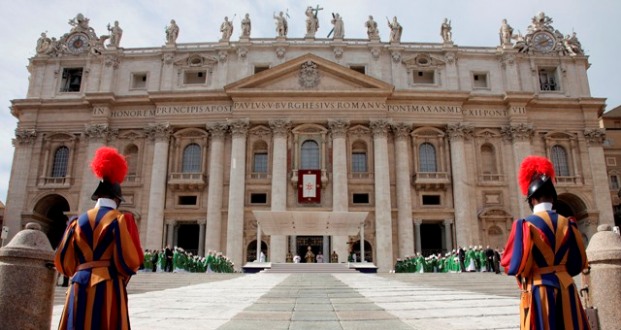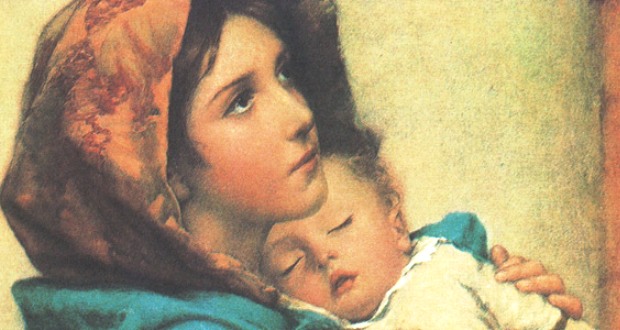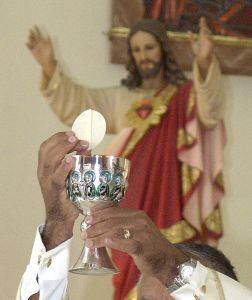The Sacrament Of Matrimony – Pt 3

THE CELEBRATION OF MARRIAGE
In the Latin Rite the celebration of marriage between two Catholic faithful normally takes place during Holy Mass, because of the connection of all the sacraments with the Paschal mystery of Christ. In the Eucharist the memorial of the New Covenant is realized, the New Covenant in which Christ has united himself for ever to the Church, his beloved bride for whom he gave himself up. It is therefore fitting that the spouses should seal their consent to give themselves to each other through the offering of their own lives by uniting it to the offering of Christ for his Church made present in the Eucharistic sacrifice, and by receiving the Eucharist so that, communicating in the same Body and the same Blood of Christ, they may form but “one body” in Christ.
“Inasmuch as it is a sacramental action of sanctification, the liturgical celebration of marriage… must be, per se, valid, worthy, and fruitful.” It is therefore appropriate for the bride and groom to prepare themselves for the celebration of their marriage by receiving the sacrament of penance.
According to the Latin tradition, the spouses as ministers of Christ’s grace mutually confer upon each other the sacrament of matrimony by expressing their consent before the church. In the traditions of the Eastern churches, the priests (bishops or presbyters) are witnesses to the mutual consent given by the spouses, but for the validity of the sacrament their blessing is also necessary.”
The various liturgies abound in prayers of blessing and epiclesis asking God’s grace and blessing on the new couple, especially the bride. In the epiclesis of this sacrament the spouses receive the Holy Spirit as the communion of love of Christ and the Church. The Holy Spirit is the seal of their covenant, the ever available source of their love and the strength to renew their fidelity.
MATRIMONIAL CONSENT
The parties to a marriage covenant are a baptized man and woman, free to contract marriage, who freely express their consent; “to be free” means:
-
– not being under constraint;
-
– not impeded by any natural or ecclesiastical law.
The Church holds the exchange of consent between the spouses to be the indispensable element that “makes the marriage.” If consent is lacking there is no marriage.
THE EFFECTS OF THE SACRAMENT OF MATRIMONY
“From a valid marriage arises a bond between the spouses which by its very nature is perpetual and exclusive; furthermore, in a Christian marriage the spouses are strengthened and, as it were, consecrated for the duties and the dignity of their state by a special sacrament.”
The marriage bond
The consent by which the spouses mutually give and receive one another is sealed by God himself. From their covenant arises “an institution, confirmed by the divine law,… even in the eyes of society.” The covenant between the spouses is integrated into God’s covenant with man: “Authentic married love is caught up into divine love.”
Thus the marriage bond has been established by God himself in such a way that a marriage concluded and consummated between baptized persons can never be dissolved. This bond, which results from the free human act of the spouses and their consummation of the marriage, is a reality, henceforth irrevocable, and gives rise to a covenant guaranteed by God’s fidelity. The Church does not have the power to contravene this disposition of divine wisdom.
The grace of the sacrament of Matrimony
“By reason of their state in life and of their order, [Christian spouses] have their own special gifts in the People of God.” This grace proper to the sacrament of Matrimony is intended to perfect the couple’s love and to strengthen their indissoluble unity. By this grace they “help one another to attain holiness in their married life and in welcoming and educating their children.”
Christ is the source of this grace. “Just as of old God encountered his people with a covenant of love and fidelity, so our Savior, the spouse of the Church, now encounters Christian spouses through the sacrament of Matrimony.” Christ dwells with them, gives them the strength to take up their crosses and so follow him, to rise again after they have fallen, to forgive one another, to bear one another’s burdens, to “be subject to one another out of reverence for Christ,” and to love one another with supernatural, tender, and fruitful love. In the joys of their love and family life he gives them here on earth a foretaste of the wedding feast of the Lamb:
How can I ever express the happiness of a marriage joined by the Church, strengthened by an offering, sealed by a blessing, announced by angels, and ratified by the Father?… How wonderful the bond between two believers, now one in hope, one in desire, one in discipline, one in the same service! They are both children of one Father and servants of the same Master, undivided in spirit and flesh, truly two in one flesh. Where the flesh is one, one also is the spirit.
THE GOODS AND REQUIREMENTS OF CONJUGAL LOVE
“Conjugal love involves a totality, in which all the elements of the person enter – appeal of the body and instinct, power of feeling and affectivity, aspiration of the spirit and of will. It aims at a deeply personal unity, a unity that, beyond union in one flesh, leads to forming one heart and soul; it demands indissolubility and faithfulness in definitive mutual giving; and it is open to fertility. In a word it is a question of the normal characteristics of all natural conjugal love, but with a new significance which not only purifies and strengthens them, but raises them to the extent of making them the expression of specifically Christian values.”
The unity and indissolubility of marriage
The love of the spouses requires, of its very nature, the unity and indissolubility of the spouses’ community of persons, which embraces their entire life: “so they are no longer two, but one flesh.” They “are called to grow continually in their communion through day-to-day fidelity to their marriage promise of total mutual self-giving.” This human communion is confirmed, purified, and completed by communion in Jesus Christ, given through the sacrament of Matrimony. It is deepened by lives of the common faith and by the Eucharist received together.
“The unity of marriage, distinctly recognized by our Lord, is made clear in the equal personal dignity which must be accorded to man and wife in mutual and unreserved affection.” Polygamy is contrary to conjugal love which is undivided and exclusive.
The fidelity of conjugal love
By its very nature conjugal love requires the inviolable fidelity of the spouses. This is the consequence of the gift of themselves which they make to each other. Love seeks to be definitive; it cannot be an arrangement “until further notice.” The “intimate union of marriage, as a mutual giving of two persons, and the good of the children, demand total fidelity from the spouses and require an unbreakable union between them.”
The deepest reason is found in the fidelity of God to his covenant, in that of Christ to his Church. Through the sacrament of Matrimony the spouses are enabled to represent this fidelity and witness to it. Through the sacrament, the indissolubility of marriage receives a new and deeper meaning.
It can seem difficult, even impossible, to bind oneself for life to another human being. This makes it all the more important to proclaim the Good News that God loves us with a definitive and irrevocable love, that married couples share in this love, that it supports and sustains them, and that by their own faithfulness they can be witnesses to God’s faithful love. Spouses who with God’s grace give this witness, often in very difficult conditions, deserve the gratitude and support of the ecclesial community.
Yet there are some situations in which living together becomes practically impossible for a variety of reasons. In such cases the Church permits the physical separation of the couple and their living apart. The spouses do not cease to be husband and wife before God and so are not free to contract a new union. In this difficult situation, the best solution would be, if possible, reconciliation. The Christian community is called to help these persons live out their situation in a Christian manner and in fidelity to their marriage bond which remains indissoluble.
Today there are numerous Catholics in many countries who have recourse to civil divorce and contract new civil unions. In fidelity to the words of Jesus Christ – “Whoever divorces his wife and marries another, commits adultery against her; and if she divorces her husband and marries another, she commits adultery” the Church maintains that a new union cannot be recognized as valid, if the first marriage was. If the divorced are remarried civilly, they find themselves in a situation that objectively contravenes God’s law. Consequently, they cannot receive Eucharistic communion as long as this situation persists. For the same reason, they cannot exercise certain ecclesial responsibilities. Reconciliation through the sacrament of Penance can be granted only to those who have repented for having violated the sign of the covenant and of fidelity to Christ, and who are committed to living in complete continence.
Toward Christians who live in this situation, and who often keep the faith and desire to bring up their children in a Christian manner, priests and the whole community must manifest an attentive solicitude, so that they do not consider themselves separated from the Church, in whose life they can and must participate as baptized persons:
They should be encouraged to listen to the Word of God, to attend the Sacrifice of the Mass, to persevere in prayer, to contribute to works of charity and to community efforts for justice, to bring up their children in the Christian faith, to cultivate the spirit and practice of penance and thus implore, day by day, God’s grace.
The openness to fertility
“By its very nature the institution of marriage and married love is ordered to the procreation and education of the offspring and it is in them that it finds its crowning glory.”
Children are the supreme gift of marriage and contribute greatly to the good of the parents themselves. God himself said: “It is not good that man should be alone,” and “from the beginning [he] made them male and female”; wishing to associate them in a special way in his own creative work, God blessed man and woman with the words: “Be fruitful and multiply.” Hence, true married love and the whole structure of family life which results from it, without diminishment of the other ends of marriage, are directed to disposing the spouses to cooperate valiantly with the love of the Creator and Savior, who through them will increase and enrich his family from day to day.
The fruitfulness of conjugal love extends to the fruits of the moral, spiritual, and supernatural life that parents hand on to their children by education. Parents are the principal and first educators of their children. In this sense the fundamental task of marriage and family is to be at the service of life.
Spouses to whom God has not granted children can nevertheless have a conjugal life full of meaning, in both human and Christian terms. Their marriage can radiate a fruitfulness of charity, of hospitality, and of sacrifice.
THE DOMESTIC CHURCH
Christ chose to be born and grow up in the bosom of the holy family of Joseph and Mary. The Church is nothing other than “the family of God.” From the beginning, the core of the Church was often constituted by those who had become believers “together with all [their] household.” When they were converted, they desired that “their whole household” should also be saved. These families who became believers were islands of Christian life in an unbelieving world.
In our own time, in a world often alien and even hostile to faith, believing families are of primary importance as centers of living, radiant faith. For this reason the Vatican Council II, using an ancient expression, calls the family the Ecclesia domestica. It is in the bosom of the family that parents are “by word and example… the first heralds of the faith with regard to their children. They should encourage them in the vocation which is proper to each child, fostering with special care any religious vocation.”
It is here that the father of the family, the mother, children, and all members of the family exercise the priesthood of the baptized in a privileged way “by the reception of the sacraments, prayer and thanksgiving, the witness of a holy life, and self-denial and active charity.” Thus the home is the first school of Christian life and “a school for human enrichment.” Here one learns endurance and the joy of work, fraternal love, generous – even repeated – forgiveness, and above all divine worship in prayer and the offering of one’s life.
We must also remember the great number of single persons who, because of the particular circumstances in which they have to live – often not of their choosing – are especially close to Jesus’ heart and therefore deserve the special affection and active solicitude of the Church, especially of pastors. Many remain without a human family often due to conditions of poverty. Some live their situation in the spirit of the Beatitudes, serving God and neighbor in exemplary fashion. The doors of homes, the “domestic churches,” and of the great family which is the Church must be open to all of them. “No one is without a family in this world: the Church is a home and family for everyone, especially those who ‘labor and are heavy laden.'”
IN BRIEF
St. Paul said: “Husbands, love your wives, as Christ loved the Church…. This is a great mystery, and I mean in reference to Christ and the Church” (Eph 5:25, 32).
The marriage covenant, by which a man and a woman form with each other an intimate communion of life and love, has been founded and endowed with its own special laws by the Creator. By its very nature it is ordered to the good of the couple, as well as to the generation and education of children. Christ the Lord raised marriage between the baptized to the dignity of a sacrament (cf. *CIC, can. 1055 # 1; cf. *GS 48 # 1).
The sacrament of Matrimony signifies the union of Christ and the Church. It gives spouses the grace to love each other with the love with which Christ has loved his Church; the grace of the sacrament thus perfects the human love of the spouses, strengthens their indissoluble unity, and sanctifies them on the way to eternal life (cf. Council of Trent: DS 1799).
Marriage is based on the consent of the contracting parties, that is, on their will to give themselves, each to the other, mutually and definitively, in order to live a covenant of faithful and fruitful love.
Since marriage establishes the couple in a public state of life in the Church, it is fitting that its celebration be public, in the framework of a liturgical celebration, before the priest (or a witness authorized by the Church), the witnesses, and the assembly of the faithful.
Unity, indissolubility, and openness to fertility are essential to marriage. Polygamy is incompatible with the unity of marriage; divorce separates what God has joined together; the refusal of fertility turns married life away from its “supreme gift,” the child (*GS 50 # 1).
The remarriage of persons divorced from a living, lawful spouse contravenes the plan and law of God as taught by Christ. They are not separated from the Church, but they cannot receive Eucharistic communion. They will lead Christian lives especially by educating their children in the faith.
The Christian home is the place where children receive the first proclamation of the faith. For this reason the family home is rightly called “the domestic church,” a community of grace and prayer, a school of human virtues and of Christian charity.
Ref: ccc 1637 – 1666





